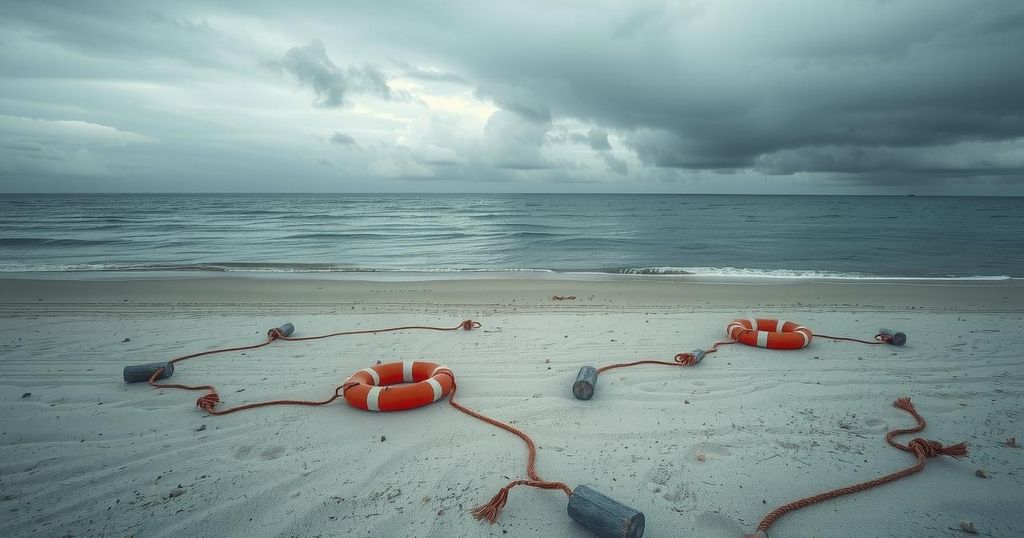Record Migrant Rescue in Tunisia Highlights Governmental Challenges
Tunisian coast guards rescued 612 migrants in a record operation on March 17, highlighting the severe dangers of illegal maritime journeys. The rescue has intensified criticism of the government as violence escalates in migrant camps. Local residents and migrants alike express concerns over safety, prompting calls for action from authorities. The situation underscores growing tensions surrounding migration in Tunisia, exacerbated by EU agreements to curb irregular crossings.
On March 17, Tunisian coast guards achieved a record rescue of 612 migrants in one night, generating significant criticism towards the authorities amidst deteriorating conditions for migrants. The Tunisian National Guard hailed the operation as a success, although the accompanying imagery revealed tragic realities, including lifeless children among survivors. This incident underscores the perils associated with illegal maritime journeys, prompting serious concern from both local populations and humanitarian observers.
The surge in migrant crossings from Tunisia’s Sfax region has resulted in olive groves becoming makeshift camps for many migrants. Despite frequent police interventions and evictions, individuals like Ralph, an Ivorian migrant, continue to reside in these conditions. Reporting the loss of two friends in a shipwreck, Ralph expressed dread over the increasingly tense situation in Sfax, highlighting the dire circumstances migrants endure in the area.
Violence has escalated, particularly in migrant camps such as those near El-Amra, where two Sub-Saharan migrants were killed recently. The violence is attributed to self-proclaimed “security teams,” known for their violent tactics, leading to mistrust in police assistance among migrants like Ralph. He stated, “If there’s a problem, we can’t go to the police because they’ll just arrest us.”
Local Tunisian residents are equally disturbed by the rising violence and insecurity, leading to protests against migrant populations amid fears of rising crime. Lawmakers, including Fatma Mseddi, have expressed alarm over the situation in camps, labeling the region a “war zone.” Calls for President Kaïs Saïed to visit these camps firsthand have gained traction amid widespread media anxiety.
Criticism of government actions has circulated on social media, particularly regarding the return of rescued migrants to shores. A man was quoted saying, “We already have too many, and they keep bringing more,” reflecting a sentiment of frustration among many Tunisians. The recent operations fall under Tunisia’s Search and Rescue commitments from an agreement backed by the European Union, which has fueled controversy over perceived governmental submission to European demands.
Migrants in El-Amra live under constant apprehension of police raids amid rising tension in the region. Ralph reported seeing a National Guard helicopter patrolling, prompting fears of deportation like those experienced by some intercepted migrants. Meanwhile, Italy’s pressure on the EU led to a deal with Tunisia, allocating significant funds to address irregular migration, resulting in increased boat interceptions while notably decreasing migrant arrivals in Italy in 2024. The Tunisian Forum for Economic and Social Rights indicates that a large majority of sea interceptions occurred during the spring months, demonstrating the seasonal nature of Mediterranean crossings.
In conclusion, the recent record rescue operation of migrants by Tunisian authorities exemplifies the severe challenges migrants face, both at sea and within camps. Escalating violence and community unrest surrounding migrant populations necessitate urgent attention from national leaders. Moreover, the ongoing collaboration with European nations to curb irregular migration has raised critical ethical questions about the treatment of migrants, mirroring broader societal tensions. Addressing these issues is imperative for establishing stability and safety in the region.
Original Source: international.la-croix.com




Post Comment